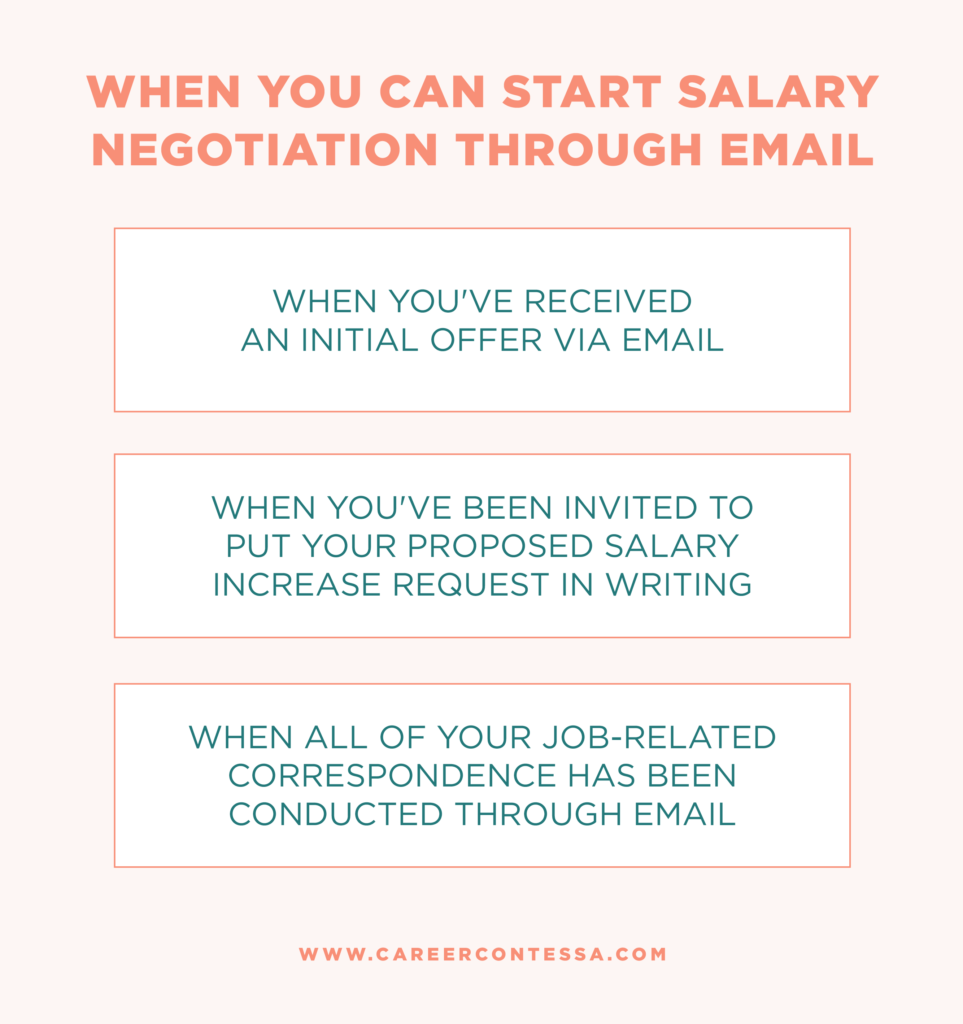How to Negotiate a Counteroffer to Get Your Salary
You got the salary offer, but it’s not quite what you expected. Here’s how to master the counteroffer.
Negotiating usually has people in one of two camps: you find it thrilling or you find it awkward. If you’re in the former group, we understand.
It can be sort of exhilarating to score a deal at your local farmer’s market or at a cool antique shop after a little haggling.
But negotiating isn’t exactly low-key haggling: the stakes are much higher when negotiating something as big and important as your salary. After all, a lot rides on how much money you make: your housing, “fun money,” ability to pay down debt, ability to save for retirement…the list goes on.
Why You Should Almost Always Counteroffer
The truth is, it almost always behooves you to make a counteroffer when it comes to your salary. Full disclosure: I’m married to a recruiter, and his advice is to “always make the counteroffer because the worst they can say is ‘no.’”
That sounds easy (especially coming from someone who talks salary day in and day out), but for the rest of us, well, it can be a little daunting—even if you like the rush you get from scoring a deal on a cute antique bowl.
It’s important to note that many studies show that women tend to negotiate for their salaries less often than men. While this study is a few years old, it found that about half the group of men who participated negotiated for their salaries, compared to about one-eighth of the women.
Similarly, CNBC reports that a study from Randstad found that 60% of women have never negotiated for their salary, and that many of them choose to leave a job for one with higher pay if they feel they’re undervalued.
Let’s take some steps to take the fear out of counter negotiations. Below, we’re talking about how to handle the counter offers stage of salary negotiation—from how much to ask for to how to politely do the asking.
What Is a Counteroffer?
If this is your first salary negotiation rodeo, when you receive an initial offer, your employer will offer you a specified salary when they extend the offer of employment. You may see this in an offer letter or hear it from a recruiter or hiring manager.
The counteroffer is the number you provide when you consider their offer and then ask for a higher number (or, alternatively, additional non-salary benefits).
3 Circumstances in Which You Must Make a Counteroffer
There are certain scenarios that will likely require a counter offer. Let’s dive in.
1. Make a Counteroffer Before Starting a New Job
Arguably the most common time to expect to talk salary, starting a job is when you should absolutely expect to counter offer your potential employer’s number.
Often, the recruiter or hiring manager will ask you what salary you’d prefer early on in the hiring process. If they do, our advice is to avoid stating a number for as long as you can. In the event that you have to state a number, we recommend choosing a range. That way, you’re not locked into a given number that you gave them.
Rather, if you provide a range—let’s say $70,000 to $80,000, for example—you’ll have a little wiggle room should the offer graze the low end of that range. If they offer you $70,000, your counter offer could be for $75,000, where you can mention that you’d like to meet in the middle.
All of that said, before you can even have the counter offer conversation, you’ll have to do thorough research on what your salary should look like for that specific role, your experience level, the company, your location, and more. We dive into exactly how to conduct that research below.
2. Make a Counteroffer Once Your Performance Has Surpassed Expectations
Another time that you might be faced with a salary negotiation that involves a counteroffer is if you’ve been kicking ass at work and you’re proposing a raise to your current employer.
This might come at the end of the year when you’re reviewing your KPIs, and you find you’ve exceeded all of your goals.
It might come when you refer to your company’s leveling guide and find you’re working at a level that’s higher than your current title, which gives you leverage for a higher salary.
It might happen if you agree to a “stretch assignment” in order to grow your role and expertise. If it’s super successful and you’re continually doing work that’s above your pay grade, a salary negotiation might come into play.
One of our overarching pieces of advice is to take notes on how well you’re performing at work. Write down the feedback you receive. Note (ideally with quantifiable data) how well you are performing regarding specific goals you’ve set.
Measure and report those KPIs so that you can see how well things are going. All of this is valuable information to have on hand when you go to make a counteroffer during a salary negotiation process.
3. Make a Counteroffer When Promoted (Officially or Unofficially)
Another time you’re likely to be faced with dealing with a counteroffer is when you receive a promotion. This is a traditional time for an employer to bring up your pay, which means you should expect to be frank about what you feel you deserve.
Again, armed with detailed notes about how much you’ve done for the company as well as data about how much others in your role with your experience level make, you’ll be well equipped to make that counteroffer.
How to Make a Smart Counteroffer
Now that you know when to expect this conversation to come up, let’s talk about how to prepare for it.
1. Do Your Research
There’s no way around the fact that you’re going to need to research before having this conversation and formulating a counteroffer.
To get started, we recommend visiting different online salary calculators as well as databases like The Salary Project, Glassdoor’s salary resources, and the Bureau of Labor Statistics. Each of these contains valuable data that will help you determine a general salary range for your role.
The keyword here, however, is “range.” Since salaries vary so much across the board, it’s difficult to pin down an exact number for your role, industry, experience level, company, location, etc. But you will at least get a ballpark idea of what you should ask for.
Secondly, you might consider asking around your network. We get that these conversations can be sort of awkward, but if asked delicately and without being demanding, we think it’s high time that employees communicate openly about compensation so that we can hold companies accountable for equitable pay.
Here’s a list of our eight favorite tools that help you calculate salary.
2. Know What You Are Worth
In addition to what the general salary range is for your role and industry, you’re going to take some time to self-evaluate. We recommend grabbing some paper and jotting down:
- Your skill level
- Your experience level
- Your education level
- Successful projects that you’ve spearheaded
- Your unique skills that benefit your role
- How you’ve performed regarding your professional goals
- The professional development or upskilling opportunities you’ve taken advantage of (especially if you did these on your own time)
- Ways that you’ve reached in to help others on your team
- Any bits of helpful feedback about your performance that you’ve saved
- Anything that might come into play when it comes to what you’re “worth” in your professional role
Think about the value you’ve added to the company through your work. Once you have the answers to those questions top of mind, you’ll have an idea of where you fall in terms of the general salary range.
You can use the fact that you took an additional course in your area of expertise and that you have volunteered as a co-lead of a specific work task to your advantage here.
Alternatively, if you’re just starting out and don’t feel like you have a lot of leverage in terms of experience, you might consider counter negotiating for things like extra benefits, flexible scheduling, or extra funding for professional development opportunities.
The key here is self-reflection in order to most effectively strategize before your counter offer conversation.
3. Practice Beforehand
We’re big fans of the mock interview. Yes, it’s kind of awkward. Yes, it’s also very much worth it. Grab a mentor, friend, or family member you trust to help you run through how you think the conversation might go.
You can even throw out practice numbers so that you’re used to asking for what you want. Practice saying that you need time to think about their offer—or what they say in response to yours.
There is no need to respond right away, even if you feel pressured to. Big decisions like these take time, and your employer should know and respect that.
4. Negotiate in Person When Possible
We all live in the digital world now, so this one may make you cringe. (It makes me nervous to even think about it.)
But! It’s important to have this conversation in-person, when possible. That way, it’s easier to read body language, show gratitude for your employer’s offer, and calmly explain why you’re countering.
There’s a “human” element that can get lost if this is done over the phone—and especially via email—that you can’t replace. Having this conversation in person is the best way to go about it. In fact, we don’t recommend that you talk salary at all over email if you can avoid it.
However, in the case that you need to negotiate via email, we have you covered with our guide to writing salary negotiation emails.

The second-best option is to present your counteroffer via video chat. That way, you still get a human-to-human connection, even though it’s technically through a screen.
5. Consider Alternative Benefits and Perks
As we mentioned above, salary conversations are nuanced. For example, if you’re working for a start-up that can’t afford to pay you the number you’ve countered, you might consider asking for a “juiced up” benefits package in lieu of your proposed salary number.
Even if you work for a large corporation, you might find extra vacation days more “valuable” than extra salary dollars. Here are some ideas as to other non-salary options to consider when formulating your counteroffer:
- Company equity + stock options
- Paid time off + vacation days
- Flexible work hours
- Signing bonus + regular bonuses
- Professional development + upskilling funds
- Opportunities for travel
- Opportunities for paid sabbatical leave
- A “higher” title that you can leverage in the future
When to Walk Away from a Bad Offer
You’ve done your research and you know your worth. You’ve determined that your hard work and experience mean you deserve a certain level of compensation. If your employer can’t meet you in an area in which you feel comfortable, it might be time to walk away.
You’ll have to use your judgment here—what number is your “bottom line”? Would you be willing to change companies in order to make more money, even if that means leaving a team you enjoy? Do you find fulfillment in your role?
Would you take less money in order to gain experience in a specific industry? All of these questions come into play here—and you’re the expert. All the power to you!
World’s Best Hack: A Script To Ask For A Raise
Download our free raise script + learn:
Heads up! By downloading our script you’re agreeing to join our newsletter. You can unsubscribe at any time!







